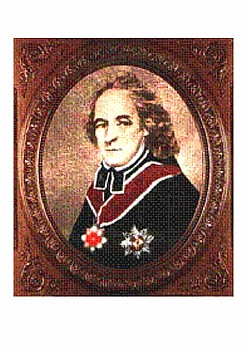|
- - - -
Daniel Narbut
NARBUTT Daniel Kazimierz
(03.01.1738 – 17.03.1807)
Philosopher, teacher, translator, a Catholic priest. Doctor of Civil and Canon Law. The author of the first Polish textbook on logic
Daniel Narbutt was born in the village of Krupa (Krupava), Lida district of Wilno province. He studied at the Piarist school in Shchuchyn, was a novice in the novitiate of the town of Lyubeshov, Pinsk county of Brest province. In 1757-1759 he studied at the Piarist Collegium in the village of Dubrovitsa, Pinsk county of Brest province. In 1759 he studied philosophy and mathematics at the Piarist Collegium in Wilno (now Vilnius, Lithuania), about 4 years in the Piarist school in Rome, where in 1761 he was initiated to the priesthood. After returning to his homeland in 1764, he was appointed professor and prefect of the Piarist Collegium in Dubrovitsa. Then he was moved to Wilno, where he lectured on philosophy at the Piarist Collegium, was prefect of the Piarist printing house. In 1755-1775 he was a member of the Piarist Order, later a secular priest in Radzymin under Warsaw and in Lida. In 1773-1774 he served in Germany and France. In 1775-1792 he worked in the Commission of National Education in Warsaw, in the first Ministry of National Education in Europe. In 1769 he published in Wilno the first Polish textbook on logic, "Logic, or Science of reasoning and thinking through the essence of things" (reissued in 1775, 1782, 1791, 1799 respectively). He is the author of the course "Eclectic Philosophy". In 1771 together with his students he published "Selected judgments from philosophy ...." After 1795 he retired, lived in the village of Radivonishki, Lida county of Grodno province, and there he died. Holder of an Order of St. Stanislav (1793).
Narbutt was a representative of the eclectic trend in the philosophy of the Enlightenment. He considered Philosophy the most important discipline. In his writings he advocated the freedom of philosophizing, linking it with the search for truth and a critical attitude to the statements of any thinkers, regardless of their credibility. He consistently opposed scholasticism. He saw the purpose of scientists and philosophers in the service to the society, in the development of sciences directed to the solution of practical problems. He considered the accuracy and evidence of ideas as the basis of knowledge, and adhered to the principles of Descartes`s method. In order to establish the truth he demanded a full and diverse study of phenomena. He believed that man can comprehend the truth.
He was the critic of the class system of education and upbringing, especially of the Jesuit concept, he studied the school reform in Belarus and Lithuania. He advocated the need for secular education. He considered secular ethic as one of the major academic disciplines. In 1775 the Commission of National Education appointed him a member of the Society for the compilation of elementary books". He wrote two chapters for the "Code of Parish Schools" and instruction "About inspecting of schools", in which he insisted that necessary practical skills and knowledge which would be helpful to the person in the emerging capitalist society should be taught at schools of the Commission of National Education. He paid special attention to the need for humane treatment of teachers with students from poor families, who constituted the bulk of parish schools. He was against corporal punishment of students.
In 1771 he translated the book "Military Science of the Prussian king, set out for his generals" from French into Polish. In the preface, he indicated that those activities and those policies that aimed to benefit all the people, contributed to the development of manufactures and mining, to the improvement of agriculture, to the development of the domestic market were sensible and humane. In the early 1770's he suggested an idea about the social nature of human, close to the ideas of Locke and Grecius. He considered the state as an organization that arises in the interest of each and every one individually. He defended the idea of autonomy of natural individual rights from the state, which are only guaranteed by the state. He stated that the basis of the social environment is the laws and strict adherence to them. His translations of religious works «Evangile meditee» (Evangelische reasoning) and «La religion christienne meditee» (Discourse on the Christian religion) from French remained unpublished.
Works:
1. Logika, albo rozwazania i rozsadzania rzeczy nauka, wedlug ktorej kazdy ma we wszystkim prawdy dochodzic i strzec sie falszu. Wilno, 1769.
2. Z filozofii wybrane zdania, ktore Nayjasnieyszemu Stanislawowi Augustowi, Krolowi Polskiemu, ... przypisane. Wilno, 1771.
3. Nauka zolnierska krola pruskiego dla jego generalow dana. Wilno, 1771.
Literature:
1. Moszynski A. Wiadomosc o Kazimierzu Narbucie autorze pierwszej logiki w jezyku polskim // Rocznik Towarzystwa Naukowego Krakowskiego. 1843. T. 2. S. 249–262.
2. Narbutt O. O pierwszym polskim podreczniku logiki. Z rozwazan nad filozofia Oswiecenia. Lodz: Zaklad Narodowy im. Ossolinskich we Wroclawiu, 1958. 146 s.
3. Дубровский В.В. Казимир Нарбут. Минск: Наука и техника, 1979. 136 с.
4. Stasiewicz-Jasiukowa I. Kazimierz Narbutt (1738–1807). Warszawa; Lida. 2005. 79 s.

© National Academy of Sciences of Belarus, 2011
|
|


